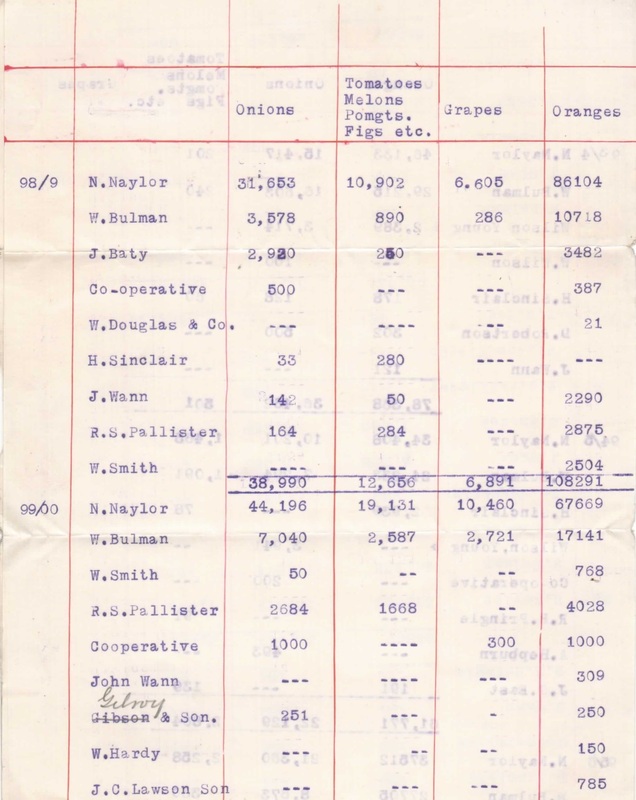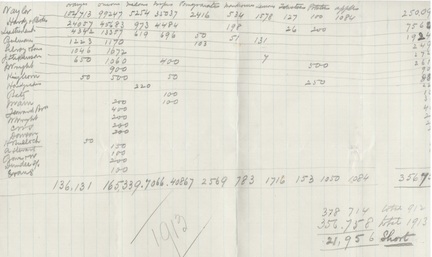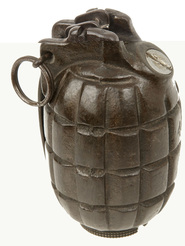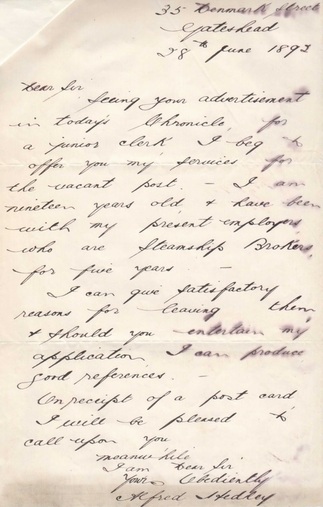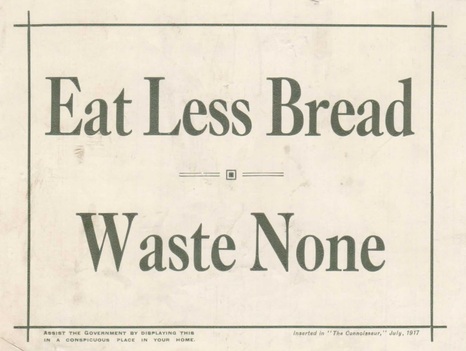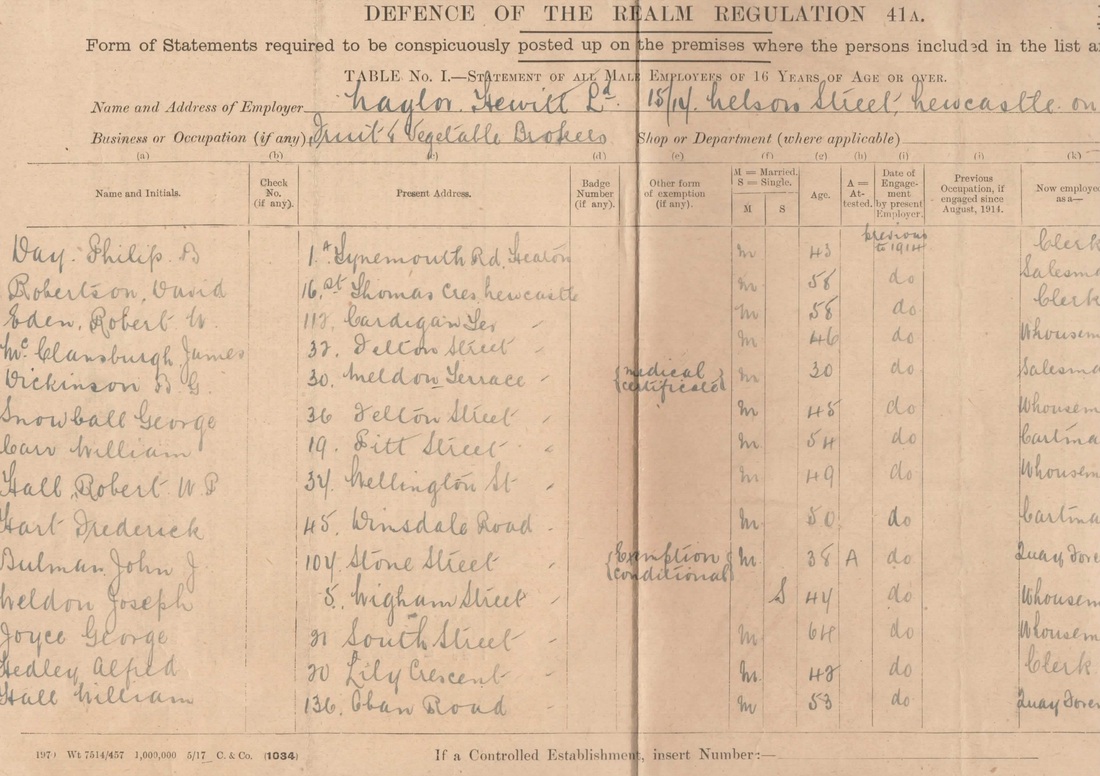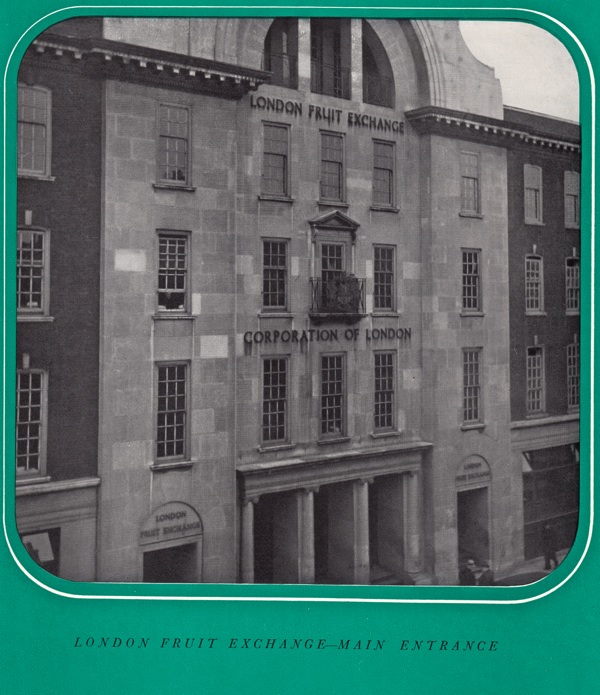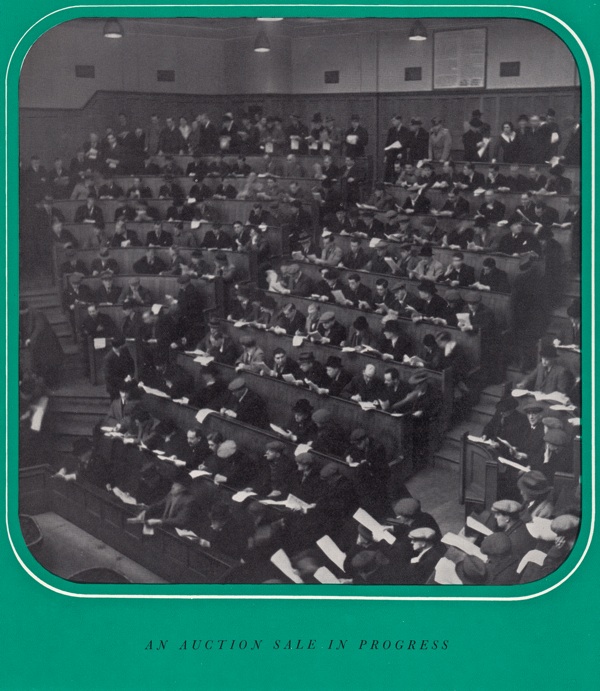IntroductionWith the centenary of the outbreak of World War I rapidly approaching, I have focused my blog this month on the records of a firm of fruit brokers in Newcastle upon Tyne 'Naylor Hewitt Ltd' and the information that can be gleaned from them about the people and the times leading up to, during and after the Great War of 1914-1918. 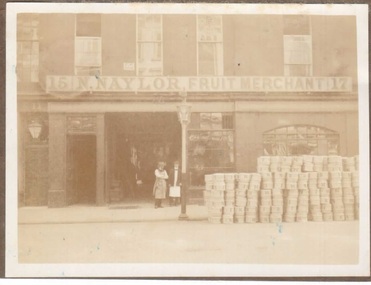 Shop Front in Nelson Street Shop Front in Nelson Street Nathaniel Naylor was born in Leeds in 1852, the son of William Naylor, also a fruiterer, who migrated North with his family and brother to Newcastle in the mid 1850's. Nat's sister Mary Jane married James Hewitt in 1878. James was born Newcastle in 1854, son of James Hewitt, fruiterer and market gardener born Crookham in 1821. James Snr and his family migrated south to Newcastle in the 1840's. The two families would merge to become one of the largest firm of fruit brokers and one of the oldest businesses in Newcastle. An excerpt from the "Market Grower & Salesman & Fruit Trader" of 1929 describes the business thus:- "The history of the Naylor firm is of particular interest as is is one of the oldest businesses in Newcastle , dating from 1840. Another interesting fact connected with it is that it has always occupied the same premises in Nelson Street (Nos 13, 15 and 17) and has never therefore been in the market* itself. * by market the magazine is referring to the old Green Market The Pre War Years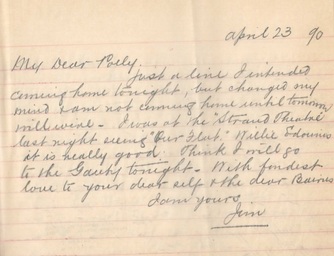 James Hewitt to wife Mary Jane (Polly) James Hewitt to wife Mary Jane (Polly) From the old carbon copy telegraph books it becomes apparent that James Hewitt travelled extensively as a buyer. Written in the book is this charming note to his wife and "dear bairns", illustrating it was not all hard work! This brief little note holds a wealth of social information. "Our Flat" was a comedy farce written by Mrs H Musgrave that ran for over 645 nights at The Opera Comique theatre also in the Strand before its closure in 1899. The show must have moved to The Strand Theatre in which the then renowned actor and comedian Willie Edouin had a financial interest. He both managed and starred in the production. The Strand theatre along with others in the district was demolished to make way for Aldwych tube station in 1905. Disused parts of this station were used to protect artworks from galleries and museums from bombing during both world wars. The station itself closed in 1994. The same day James writes to his brother in law "Melons are dear, but thought would send you one basket, such are making here 5/- and more - Jersey grapes better than Turnbulls are worth 4/6 per lb, thought that too dear. Radishes sent today were a very nice lot and a little cheaper, will not send many tomorrow. Broccoli I could see thought a little below market price if more required tomorrow wire early......" The last entry in the telegraphic message book is 3rd Oct 1896 to Edward Todd of Sunderland offering him various varieties of grapes described as "fine bunchy stuff" purchased in Glasgow the previous Friday.
The return for the year 1912 showed N. Naylor as having imported a total of 247,700 'packages' and total for all Others is 130,674! An Aside...Alfred Hedley
In the 1911 census he has moved from Denmark Street to 88 Shortridge Terrace, Jesmond, with his wife Mary Mathews, twin boys Alfred and Norman aged 4, and 2 year old daughter Margaret Foster Hedley. Alfred now describes his occupation as Clerk & Salesman to a wholesale fruit merchant. Alfred was born in Gateshead in 1875 and tracing him, his siblings and his mother through the previous census returns throws up some interesting information. In the 1871 census his mother Ann is living with a Mark Hedley aged 76, status widower. Ann's relationship to the head of the house is not stated but further digging proves this to be her father. She is listed as unmarried and with three small children. Subsequent census returns reveal the absence of a man as head of the household although Ann's status changes to married and by 1891 a widow. In 1874 it became compulsory for a father to be present at the registration of the birth for the child to take his name. In the case of Alfred this column is blank, and Alfred is given his mother's surname of Hedley. Alfred remained loyal to the firm throughout the war and beyond retiring in 1937, aged 62 after a service of 45 years. In 1929 the longest serving employee was William Hall, Quay Foreman who had been in the service of Nat Naylor for 47 years. 1914 - 1918, The War Years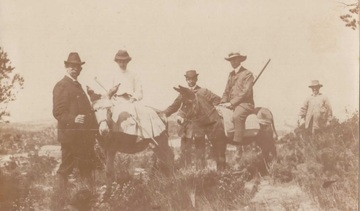 The sons of Nat Naylor and James Hewitt, Nat Naylor Junior and Nat Naylor Hewitt respectively, joined the business in the pre wars years, but it was not until 1916 that the Limited Company was formed. In 1907 Nat Naylor Hewitt was to visit Spain with his young wife Eveline Burgess, where a business relationship and friendship with grower and shipping agent Henri Leopold Sacki, was forged that would span the generations However, in November 1915 at a meeting at the British Consulate in Valencia, it was agreed that:- "drastic measures be taken to cease all dealings with enemy firms in Valencia ......It was moved and agreed that a direct appeal be made to the Fruit Brokers and Receivers in the United Kingdom to support the scheme and to agree, individually and collectively to refuse to handle, finance etc., enemy goods, chartered ships, or enemy interests, whether concerned directly or indirectly." 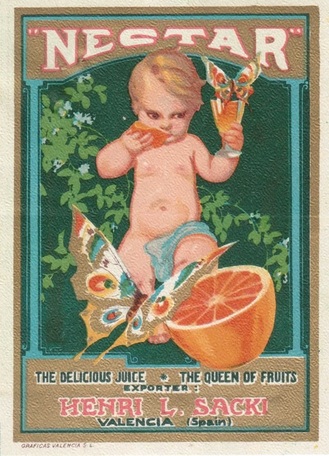 It would appear that somehow Henri Sacki, who was I believe, a Belgian citizen was inadvertently and blamelessly caught up in some conspiracy as a result of the above ruling. There are several letters that pass between himself and Nat N Hewitt, the details of the supposed complaint remain undisclosed until a letter from Henri Sacki in January 1916 reading:- "First of all many thanks to you as a true friend. It is in such moments that one gets to know people properly - I won't forget it for the rest of my life.....and have been able, favoured by circumstances to load my boats rapidly and at good rates, people here got jealous and some of them which I considered less true friends acted against me. Armstrong knows a good deal about this but I never expected things would reach that point. What wrong have I done that such measures are taken against me? I am most anxious to get to the bottom of this affair...." Further reference is made in correspondence in April 1916 between the Foreign Trade Department and Naylor Hewitt Ltd of unfavourable reports of Mr Sacki and the Company is ordered to have no further dealings with him. Finally on 4th April 1919 the matter is finally resolved and the War Trade Department writes:- "I am instructed by the Director of the War Trade Department to inform you that any adverse opinion which may have hitherto been expressed by this Department or the Foreign Trade Department relating to Henri Leopold Sacki of Valencia is now withdrawn..." Whilst imports of fruit and vegetables continued the Department of Foreign Trade made life less than easy, with delays in the issue of customs certificates, handling goods at the docks, etc., resulting in loss of stock. This problem was campaigned against by M Isaacs & Sons Ltd of London and was not succesfully resolved until October 1916, as this letter from the Controller, Foreign Trade Department testifies. "....... I am directed by Viscount Grey of Fallodon to inform you that in order to avoid risk of perishable goods becoming unmarketable pending the production of Certificates of Interest, instructions have been issued to his Majesty's Custom Officers that such goods may be handed over to the broker to who they are consigned ......" Further complications ...RationingRationing was not introduced until the latter years of World War I. After initial panic buying in August 1914 that left many shop shelves empty, imports continued and the Nation settled into some sort of normality. Whilst bread was not itself subject to rationing, the ingredients used to make it became so. By April 1916 it was estimated that Britain had only six weeks of wheat stocks remainingg, with wheat imports coming to Britain from mainly America and Canada the German unrestricted submarine warfare in 1917 had a devastating effect on British merchant shipping in the Atlantic. Fruit and vegetables were not rationed during the war, but they were harder to obtain and prices rose exponentially. Looking at the records of imports from Valencia for the business of Naylor Hewitt total 'packages' for the war years were as follows:- 1914/15 - 218,185 1915/16 - 210,359 1916/17 - 231,007 1917/18 - absent Volumes may have dropped but the business carried on. Defence of The Realm Regulation 41AThis document was required to be positioned in a prominent position within the employers premises and details all male employees over the age of 16. As a result of conscription introduced in January 1916 all single men between the ages of 18 and 41 were eligible to be called up. In May 1916 this was extended to married men and the upper age limit was eventually raised to 51 in the last months of the war in 1918. The above list gives us the names and addresses of all such exempt employees of Naylor Hewitt Ltd, Alfred Hedley is second from bottom aged 42 and now living at 20 Lily Crescent, Newcastle. He has avoided conscription by the skin of his teeth. The reverse of the document also states that there were four women working for the Company, but no further details of them or the positions they held are given. Personal Loss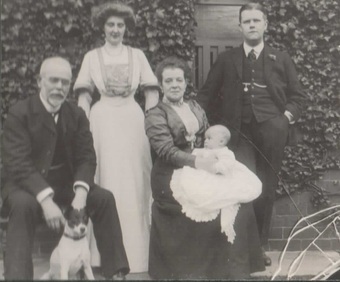 Hewitt Family circa 1908 Hewitt Family circa 1908 On the 17th March 1917, Mary Jane Hewitt (nee Naylor) died. She is pictured to the left seated with her grandson Richard Naylor Hewitt on her knee, her husband James Hewitt also seated, her daughter in law Eveline Burgess and possibly her nephew Nathaniel Naylor jnr standing to her right. Note the dog in the bottom left of picture. Dogs feature frequently in the family photo albums, with pages dedicated solely to their canine friends! All three of Eveline's brothers fought in the war, but only two would return Sidney & Roland. During their absence the business of Roland Burgess Ltd, textile wholesalers was overseen by Nat Naylor Hewitt in addition to his own business interests. Post War YearsAmongst the requests for release from service following the end of the war in November 1918 was one that particulary intrigued me. It was for a Private Jacob Elkan, who I believe became a naturalised British Citizen in February 1913, originally from Germany he was at that time a resident in Newcastle upon Tyne. In the letter requesting his release from the army it states he "will take the management of an important part of our business on his return". I can find no further mention of Mr Jacob Elkan amongst the company's papers but a listing in a trade directory of 1936 describes him as a 'fruit salesman' and in a letter home in 1940 from Stephen Burgess Hewitt, kind regards are sent to Herr Elkan. It would further appear that he settled in Newcastle and married Helen Surtees in 1924 with whom he had a daughter. Expansion With the war behind them, Naylor Hewitt Ltd continued to grow and in 1928 became incorporated with the company of Connolly Shaw Ltd, who controlled similar establishments in Manchester, Cardiff, Belfast, Dublin & Glasgow. Connolly Shaw was one of six founder members of the London Fruit Exchange a specialised fruit distribution centre which held it's first auction in 1929. Auctions were held here every Monday, Wednesday and Friday. An average of 40,000 and 50,000 packages were offered for sale on each day. On some occasions as many as 100,000 were catalogued for sale on one day. It would be about this time that Richard Naylor Hewitt grandson of James Hewitt and Mary Jane Naylor joined the family firm. 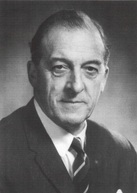 R N Hewitt MBE R N Hewitt MBE By the mid 1960's plans were afoot regarding the relocation of the old Green Market in Newcastle upon Tyne, which was now the subject of a Compulsory Purchase Order and designated a 'Comprehensive Development Area'. The choice was between a private scheme in Melbourne St or a new bespoke Corporation project in south of the river. By 1969 the business of Connolly Shaw Ltd had relocated to the new wholesale market in Team Valley, Gateshead. Richard N Hewitt was awarded an MBE for service to industry in connection with this project. He retired on the 30th June 1974 and with no sons to follow him into the business, thus ended the family connection of Naylor & Hewitt with the fruit trade. ConclusionEven the smallest scrap of paper can contain a wealth of historical information!
5 Comments
|
AuthorSusie Douglas Archives
August 2022
Categories |
Copyright © 2013 Borders Ancestry
Borders Ancestry is registered with the Information Commissioner's Office No ZA226102 https://ico.org.uk. Read our Privacy Policy

